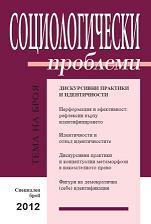Епистемичната демокрация: квалификация и/или изключване
Epistemic Democracy: Qualification and/or Exclusion?
Author(s): Ruzha SmilovaSubject(s): Social Sciences
Published by: Институт по философия и социология при БАН
Keywords: Normative democratic theory; authority and legitimacy of democratic government; proceduralist and instrumentalist accounts of legitimacy; Consent as condition of legitimacy; David Estlund; epistemic proceduralism;
Summary/Abstract: The contemporary debate on the authority of democracy revolves around a dilemma: to be the preferred form of government , democracy must deliver good government, yet the impartial procedures, taken by many as the defining mark of democracy, do not by themselves guarantee such result, though they may accidentally produce it. The article discusses the main theses and some shortcomings of the two major positions in the debate – the proceduralist and the instrumentalist. Against this back- ground, the major steps in the original contribution to the debate of David Estlund’s „epistemic proceduralism“ are reconstructed. Several possible criticisms – both from an instrumentalist and from a proceduralist position – of such a „hybrid“ conception of the authority of democracy are outlined. A major problem for a conception of this type is to offer a non-arbitrary way of limiting the group of citizens, whose consent is necessary for legitimacy, without either fully dispensing with consent as a condition for legitimacy, or, conversely, turning citizens into hostages of the willful veto of a few. At the concluding part the problems with deter- mining the exclusive group of those „qualified“ to have veto rights are discussed, demonstrating the limits of „epistemic proceduralism“ as an account of the authority of democratic government.
Journal: Социологически проблеми
- Issue Year: 44/2012
- Issue No: Special
- Page Range: 192-211
- Page Count: 20
- Language: Bulgarian
- Content File-PDF

